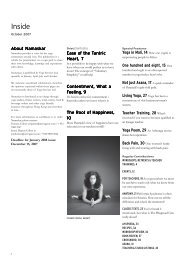Namaskar July 2010
You also want an ePaper? Increase the reach of your titles
YUMPU automatically turns print PDFs into web optimized ePapers that Google loves.
Dristi Tapas<br />
Volun<br />
oluntary<br />
Suf<br />
uffering<br />
Clayton Horton<br />
tapas is the hard work<br />
involved in any<br />
transformational<br />
process<br />
WHAT IS TAPAS? A MYSTERY TO<br />
the lazy… a magic ingredient for the<br />
evolving yogi….accomplished athletes,<br />
yogis and musicians know it well.<br />
Tapas is traditionally defined as to burn or<br />
to glow or a method to produce<br />
energy…or a process which illuminates the<br />
imperfections of one’s own personality<br />
Tapas is listed as one of the five niyamas or<br />
observances, which one of the eight limbs<br />
of Ashtanga yoga from the Patanjalim<br />
Yoga Sutras. In many commentaries, tapas<br />
is often defined as austerity, penance or<br />
discipline. Simply put, tapas is the hard<br />
work involved in any transformational<br />
process.<br />
A more esoteric perspective of tapas is,<br />
voluntary suffering for one’s own<br />
purification and development. This<br />
intentional suffering is one in which we<br />
place ourselves in a situation in which the<br />
heat of the moment begins to cook our<br />
entire being, physical body, mind and sense<br />
organs included.<br />
By consistent, hard work, unhelpful or<br />
negative samscaras (habits), kleshas (root<br />
afflictions) are forced to surface in our<br />
awareness and then discarded, burned,<br />
released and purged. Ahimsa (nonviolence)<br />
and vairagyam (dispassion) have their place<br />
in one’s life and practice, but we all need to<br />
do some authentic “housecleaning” to see<br />
the brilliance of jewel of the Self shine<br />
forth.<br />
One simple example of tapas is sitting in a<br />
sweltering hot sauna to sweat out toxins.<br />
Another example is B.K.S. Iyengar’s saying,<br />
“the posture begins when you are ready to<br />
come out of it. Doing the hard work of<br />
staying in the asana even though our legs<br />
are shaking and our breath is becoming<br />
unsteady is what is required for us to<br />
develop core strength and stability.<br />
Tapas for mental development or<br />
purification could be regarded as training<br />
our minds to concentrate on one thing for<br />
an extended period of time. This Tapas-ia<br />
of the mind involves harnessing the verve<br />
and inspiration to let go of our limited<br />
Self-concepts and unhealthy negative<br />
thought patterns.<br />
In the Yoga Sutras, Patanjali begins his<br />
discussion of sadhana or spiritual practice by<br />
saying along with svadyaya (study of the<br />
Self) and isvarapranidhana (surrendering to<br />
the divine), tapas is a necessary ingredient<br />
for any authentic yoga practice (YS 2:1).<br />
Without tapas we never make it onto the<br />
mat or meditation pillow.<br />
Thinking about yoga, planning to do yoga,<br />
talking about yoga is wonderful, inspiring<br />
and easy. Doing the work is another. Going<br />
deeper into our practice consistently to get<br />
stronger and to get clearer glimpses of our<br />
true eternal nature is hard work. To taste<br />
the fruit of our practice is a great source of<br />
real joy and peace. Learn to schedule and<br />
manage your time. Prioritize work, play,<br />
eating and practice to<br />
create a balanced, healthy<br />
and joyful life for yourself.<br />
Clayton is director of<br />
Greenpath Yoga.<br />
www.greenpathyoga.com<br />
When the body develops the power to endure<br />
hardship and when the mind does not get easily<br />
upset by lack of physical comfort, one becomes<br />
qualified for practicing yoga<br />
Swami Hariharananda<br />
10

















